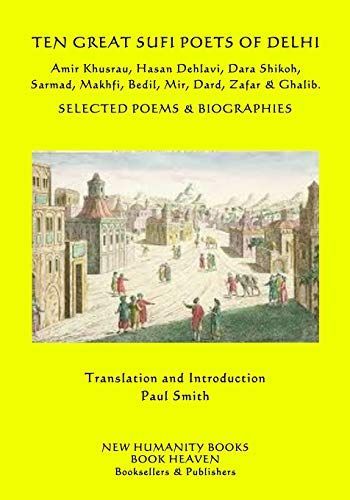
Ten Great Sufi Poets of Delhi Amir Khusrau, Hasan Dehlavi, Dara Shikoh, Sarmad, Makhfi, Bedil, Mir, Dard, Zafar and Ghalib - Selected Poems and Biographies
TEN GREAT SUFI POETS OF DELHI Amir Khusrau, Hasan Dehlavi, Dara Shikoh, Sarmad, Makhfi, Bedil, Mir, Dard, Zafar & Ghalib. SELECTED POEMS & BIOGRAPHIES Translation and Introduction Paul Smith From the 13th to the 19th century Delhi was one of the great centres of Sufi Poetry & Culture in the Persian & Urdu languages. Amir Khusrau (1253-1324), the 'Parrot of India' composed ten long masnavis, five Divans of ghazals and other poems and many prose works. He was a Master musician and invented the sitar and was a profound influence on Hafiz. Hasan Dehlavi (1253-1328) was a close friend of Amir Khusrau and achieved greatness as a poet and Sufi. He composed over 800 ghazals. Influenced by Sadi he was called the 'Sadi of India'. Dara Shikoh (1615-1659) was the oldest son of Shah Jahan of Mughal India. He was a fine poet, his poems having the influence of Sufism. His Divan in Persian was not the only work he left, his five prose works on Sufism are still popular in India. Sarmad (d. 1659) was known for exposing and ridiculing the major religions and hypocrisy of his day, but he also wrote beautiful Sufi poetry in the form of 321 rubai's. He wandered the streets of Delhi as a naked dervish. He was beheaded in 1659 by Emperor Aurangzeb. Makhfi (1638-1702) was the beautiful, talented oldest daughter of Aurangzeb. She was imprisoned for 20 years by him for her Sufi views. Her ghazals and ruba'is are deep, spiritual and often heartbreaking. Bedil (1644-1721). His writings in Persian are extensive, being one of the creators of the 'Indian style'. He was heavily influenced by Sufism. Mir (1723 - 1810) was a leading Urdu poet and one of its pioneers. He was of the Delhi school of the Urdu ghazal. Mir practiced Malamati or 'Blameworthy' aspect of Sufism. Dard (1720-1784) is considered one of the three great poets of the Delhi school of classical Urdu poetry. He was a Sufi poet able to successfully transmit his mystical philosophy into his poetry and his ghazals can be read in both a mystical and secular way. Zafar (1775 - 1862) was the last of the Mughal emperors in India, as well as the last ruler of the Timurid Dynasty. Zafar was a noted Urdu poet and Sufi who has left behind a huge collection of ghazals in four volumes. Ghalib (1797-1869}. Fame came to him posthumously. Although he wrote ghazals, qit'as and ruba'is in Persian he is more famous for those written in Urdu. In this selection of both languages all reflect his Sufism. All the poems here are translated into the correct rhyme-structures. Selected Bibliographies. Large Format 7" x 10" Pages 752. Paul Smith (b. 1945) is a poet, author and translator of many books of Sufi poets from the Persian, Arabic, Urdu, Turkish, Pashtu, Hindi and other languages including Hafiz, Sadi, Nizami, Rumi, 'Attar, Sana'i, Jahan Khatun, Obeyd Zakani, Mu'in, Amir Khusrau, Nesimi, Kabir, Anvari, Ansari, Jami, Khayyam, Rudaki, Lalla Ded, Mahsati, Baba Farid, Iqbal, Vrind, Rahim and others, and his own poetry, fiction, biographies, plays, children's books and a dozen screenplays. amazon.com/author/smithpa